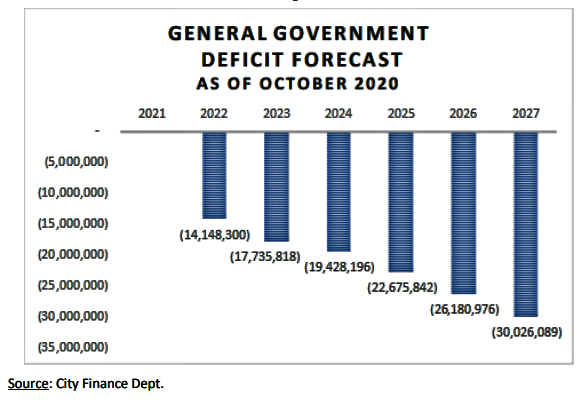As the Everett City Council unanimously passed the 2021 budget the City of Everett administration issued the final report from a 13-member Fiscal Sustainability Advisory Committee convened by Mayor Cassie Franklin. The report offered 24 recommendations for the Mayor and City Council to further explore in order to address the City’s general government budget deficit. Here is a chart showing the projected deficits over the next six years for Everett, Washington. By law the City has to have a balanced budget at the start of each year, thus no deficit for 2021.
Click link below to see final committee report and the 24 recommendations.
Committee Report FINAL (v 12.1.20)(1)_202012021549195456
Here is the Executive Summary:
The City of Everett is experiencing a financial crisis that, if left unaddressed, will continue to worsen each year, putting the City in an ever more precarious financial situation. After years of working to balance its General Government deficits with relatively minimal impact to the public, the City’s ability to insulate residents and business owners from this problem appears to have ended.
The General Government budget deficit can no longer be bridged by deferring maintenance of city facilities, further reductions of remaining administrative staff, or modest fee increases. Although the budget variance has been a major help in balancing the budget in the past decade, and will again help in 2022, it is volatile and unlikely to generate nearly the savings needed to cover projected General Government deficits after 2022. The problem has been developing over nearly two decades, but has been made much worse by the COVID-19 pandemic and the October 2020 announcement by Boeing that it will cease production of 787s in Everett.
The City’s General Government operations include crucial public services: police, fire, emergency medical response, parks, street maintenance, library, and the municipal court, among others. The City projects that between 2022 and 2027 it will face an annual gap between revenues and expenditures equating to an estimated ten to fifteen percent of total General Government expenditures. The deficit in 2022 is projected at just over $14 million, and grows to over $30 million by 2027.
With a legal obligation to balance its budget each year, the gravity of the situation cannot be overstated. City leaders and the public must understand and acknowledge that the City is in a financial crisis. City leaders will need to implement bolder measures than they have taken in the last decade. It serves no purpose to look backward and point fingers. City Hall, and City residents and business owners need to own the current reality and look forward.
The Fiscal Sustainability Advisory Committee, composed of thirteen citizen leaders from a wide array of backgrounds, was created by Mayor Franklin and launched in June 2020. The Committee was tasked to look beyond the 2021 budget and make recommendations for improving the General Government funding situation. This report presents the Committee’s assessment of the City’s current situation and offers 24 recommendations for further exploration (See Attachment C, end of report).
The Committee concludes that the City’s General Government operations are currently not fiscally sustainable. Dramatic action, and shared pain – impacting City Hall as well as residents and businesses — will be required to work our way out of this challenge. There is no silver bullet here. It is imperative that the City respond to this crisis in a balanced way. Additional efficiencies alone will not be enough. Relying solely on budget cuts would be detrimental to the community. Relying solely on new revenues is not realistic. A broad array of strategies must be pursued, simultaneously.
Our 24 recommendations fall into seven categories: Efficiencies; Additional Cuts; Additional Revenues; Transfer of Service responsibility and Partnering with Others for Service Delivery; Legislative Advocacy; Adjusting City Land Use and Economic Development Goals; and Public Information. Pursuing all 24 recommendations simultaneously is beyond the City’s capacity.
The Mayor and Council will need to prioritize where they focus their energies. More work is necessary to frame out the implementation and expected results of our recommendations and select the most promising. The General Government budget deficit is not a short term challenge; however, the Committee believes the City has a very short window to act in order to forestall dramatic cuts to programs defining our quality of life and Everett’s attractiveness as a location for businesses while working to implement longer-term solutions. Work must begin immediately in 2021.





December 2, 2020
Everett Government